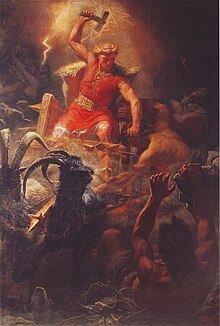Germanic peoples

The Germanic peoples are a linguistic and ethnic branch of Indo-European peoples. They came from Northern Europe and are identified by their use of the Germanic languages. During the migration period Germanic peoples spread throughout Europe, mixing with existing local populations (like Celts, Slavs/Vends, and Romans). They eventually formed the basis of many nations. These nations are connected by similar languages, common history, and culture.
The Latin word Germani was first used by Julius Caesar.
The Germanic tribes did not have a name for themselves that described all Germanic-speaking people. In English, German is first attested in 1520, replacing earlier use of Almain or Dutch. Today, in English, “Dutch” means the language or people of the Netherlands.
In the 1st century CE, Roman authors like Caesar and Tacitus wrote that Germanic-speaking peoples had divided into tribal groupings. The different tribes lived in different areas:
- The East Germanic tribes lived around the rivers Oder and Vistula, in what is now Poland.
- The Istvaeones lived around the lower Rhine River.
- The Irminones lived around the Elbe River, in what is now Germany.
- The Ingvaeones lived in Jutland and other islands that now belong to Denmark.
The Irminones, Ingvaeones, and Sons of Mannus Istvaeones are called West Germanic tribes. The Germanic people who remained in Scandinavia called North Germanic. The groups all developed separate dialects, which eventually developed into different Germanic languages.
The Germanic peoples did not call themselves West Germanic, East Germanic, or North Germanic. Those categories were created in modern times.
Each Germanic tribe was politically independent, under a hereditary king. Each tribe had a myth about who first created the tribe. For example, myths stated:

- Angul created the Angles
- Aurvandil created the Vandals (though historians are not certain this actually happened)
- Burgundus created the Burgundians
- Cibidus created the Cibidi
- Dan created the Danes
- Nór created the Norwegians
- Gothus created the Goths
- Ingve created the Ynglings
- Irmin created the Irminones
- Longobardus created the Lombards
- Saxneat created the Saxons
- Valagothus created the Valagoths
- Suiones created the Swedes (Svear)
Some Germanic kings claimed that they should have power because they were related to their tribe’s mythical founders.
Origin
[change | change source]
The early Germanic tribes spoke different dialects, but could understand each other. They shared a common culture and mythology (see Germanic mythology). Beowulf and the Volsunga saga make this clear.
At this time, the Romans forced the different peoples of Italy to be part of one big empire. Unlike Italy, no large empire forced Germanic people to unite. Because of this, the various tribes remained free, led by their own hereditary or chosen leaders.
Other websites
[change | change source]Text is available under the CC BY-SA 4.0 license; additional terms may apply.
Images, videos and audio are available under their respective licenses.
